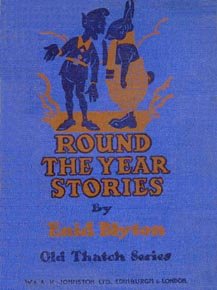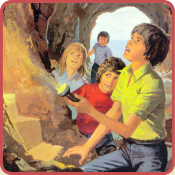
Round the Year Stories

Book Details...
First edition: 1937
Publisher: W. & A.K. Johnston
Illustrator: Uncredited
Category: Old Thatch Series
Genre: Fantasy/Nature
Type: Short Story Series Books
Publisher: W. & A.K. Johnston
Illustrator: Uncredited
Category: Old Thatch Series
Genre: Fantasy/Nature
Type: Short Story Series Books
On This Page...
Reprints
- "What's Happened Here?"
Story: Teachers World No.1440 Dec 31, 1930 - Beech-Tree Brownies
Story: Teachers World No.1604 Feb 21, 1934 - The Lion and the Lamb
Story: Teachers World No.1608 March 21, 1934 - When the Bluebells Rang
Story: Teachers World No.1406 May 7, 1930 - The Summer-Time Race
Story: Teachers World No.1458 May 6, 1931 - Tom Noddy
Story: Teachers World No.1474 Aug 26, 1931 - The Pond That Dried Up
Story: Teachers World No.1414 Jul 2, 1930 - The Silly Little Conker
Story: Teachers World No.1602 Feb 7, 1934 - A Christmas Story
Story: Teachers World No.1595 Dec 20, 1933
Long before your great-great-grandmothers were in their cradles, the Beech-tree Brownies lived peacefully in the woods. They're a shy and peaceable lot so when Princess Peronel needs a holiday she's sent to stay with them, and Enid Blyton's description of what they show her just has to be included - the earliest primroses, the robin with a white feather in his wing, the place where the dormouse is still fast asleep, and they even let her peep inside a hollow tree where seven snakes are all curled up together. A message from a rabbit comes to Bron and it's bad news - six witches are coming to steal the Princess away so the brownies arm themselves to defend her by sharpening twigs taken from the beech trees to use as spears.
What a strange name for a country - MumGumbo-Land. This is the setting for "The Lion and the Lamb," a tale that starts with a tremendous roaring noise heard by the King and his soldiers who are somewhere out in the woods. The soldiers all rush away in terror when a huge lion springs into the middle of their camp, but the brave King stands his ground and refuses to do what the lion orders him to do. Not only that, but he somehow manages to capture the beast and send him to prison for thirty-one days! The theme of this short story is very strongly connected with the month of March.
April's story has the Fairy Queen stepping from her carriage and deciding to walk home through the bluebell wood because it's such a lovely evening. "Surely there has never been a lovelier night since the world began." Put this very important person in the woods where a penniless wizard called Very-Thin is wandering around, and the plot starts to become discernable. One ransom in exchange for one queen is the order of the day (or night in this case) but the bluebells aren't prepared to let the wizard have things all his own way.
Anyone who knows anything about England must have heard of the annual Oxford/Cambridge boat race held in March or April but few people would know that it used to be attended regularly by the Rain Pixies and the Sunshine Elves. If Oxford won, the pixies cheered madly and called up storm clouds and winds, ensuring a miserable summer but if Cambridge were the victor, the Sunshine Elves would shout for joy and chase away all the clouds in the sky, which meant that everyone enjoyed a wonderful season. Unfortunately, because of the increasing public attendance, the shores became so crowded that too many of the pixies and elves were being jostled and trodden on so the Fairyland King issued an order - no elf or pixie is to attend the race again. This caused a problem of course because now there was no way to decide whether the summer would be wet or dry. Enid Blyton steps in however, and supplies a solution from the natural world.
Tom Noddy has been mentioned more than once in the Blyton World and the June/July story describes him as a bright but forgetful boy whom we know will end up receiving some kind of a wake-up call because of his slight handicap. A school trip to the London Zoo is scheduled and no one in the whole wide world wants to visit this venue more than Tom Noddy. There's to be an early rise on the day because the children have to be at school by six for the three-mile walk to catch the bus at seven so Tom Noddy plans it all out. He'll go to bed in plenty of time and set the alarm clock for half-past five the next morning thus ensuring punctuality. Round 1931 when he was living his busy little life, the common clock was a little different from the ones we have these days!
To the enquiring mind, a pond can be a very interesting place. Animals frequent it to quench their thirst, swallows skim above it to catch flies, and frogs together with fish and other creatures, live in its cool depth. One particular pond that Enid Blyton writes about is losing water each day as the sun shines down and eventually all that's left of it is a puddle at one end, which is rapidly disappearing as a donkey finishes it up. A goose who makes frequent visits thinks the donkey must have been drinking all night because now there's no water to swim in ... just mud. The word spreads and when the cows and horses join in with condemnation of the "thirsty" little donkey a decision is made to punish him. The donkey defends himself as best he can by telling the truth but it falls on deaf ears and he's issued an ultimatum - fill the pond up again or suffer the consequences.
One day Will and Peter visit a chestnut tree and collect a big bag of conkers to take home with them for a little conker bashing. They sort them out and discard one because it's too tiny - you want fine big conkers for challenging your friend to a match. Baby sister finds the little conker and plays with it until the boys return from school after a very successful day of challenges. Will gives her a bigger one and as Enid Blyton has awarded "feelings" to a host of inanimate objects, this pathetic little seed is included; the little conker is unhappy because it had enjoyed being with the little girl but now it's being ejected out of the window to land on a damp piece of ground. There it rests ... gone and forgotten - but not quite, because there's usually a happy ending to such stories.
The tale for December is connected with Yuletide of course. Jack and Peggy hang their stockings up on Christmas Eve and Jack wants to know if his parents also indulge because he wants them to receive a few treats as well but according to his mother, "Santa fills only stockings that belong to children." The children snuggle down in their beds and fall asleep but at midnight a noise awakens them and in a matter of moments with dressing gowns on, they're creeping down the stairs to the dining room where the fireplace is situated. Jack and Peggy are not the only children to have a once-in-a-lifetime experience at a late hour on Christmas Eve. A similar happening occurs in other Enid Blytons - three for example being the Fifth and Tenth Bedside Books, and the Happy Story Book.
The illustrations are passable.
Enid Blyton points out in the February story that the buds of beech trees are as sharp and pointed as tiny spears, quite unlike those of other trees.
Many of the EB books have similar sounding titles so Round the Year Stories is not to be confused with Round the Year with Enid Blyton, which is a series of nature observations.
Peronel has been used as a Princess's name in other tales for instance - "The Book of Brownies," and also in "Enid Blyton's Book of the Year" (The Lovely Present).








